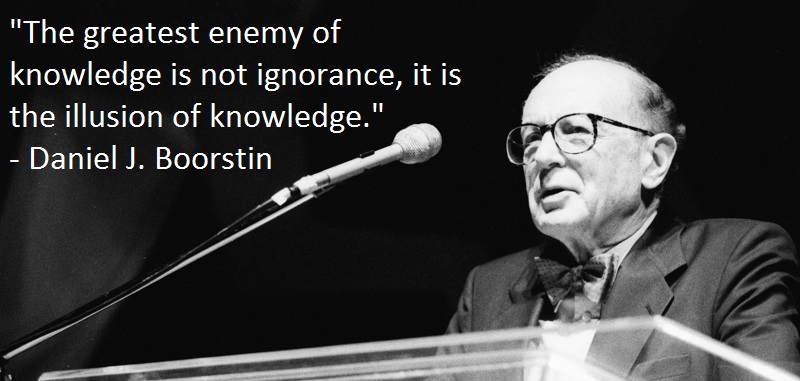Jul 21 2015
Expertise and the Illusion of Knowledge
In general people think they know more than they do. This is arguably worse than mere ignorance – having the illusion of knowledge. Psychologist David Dunning (of the Dunning-Kruger effect) recently wrote in an editorial about his own study (which I discuss here):
“What’s curious is that, in many cases, incompetence does not leave people disoriented, perplexed, or cautious. Instead, the incompetent are often blessed with an inappropriate confidence, buoyed by something that feels to them like knowledge.”
Dunning was discussing the “ignorant mind.” Further, self-perceived expertise does not protect against this effect and in fact may make it worse. A new paper published in the latest issue of Psychological Science, When Knowledge Knows No Bounds: Self-Perceived Expertise Predicts Claims of Impossible Knowledge, presents four studies exploring the relationship between perceived expertise and the illusion of knowledge.
David Dunning is the last author on this paper as well, along with Stav Atir and Emily Rosenzweig. They present the results of four studies. The first establishes the basic phenomenon: self-perceived expertise in finance predicts claiming knowledge in nonexistent financial concepts (pre-rated stocks, fixed-rate deduction, annualized credit – they did a good job making up fake technobabble.) This effect is called “overclaiming.”
That is a good research model, because there is no way someone could have actual knowledge about something that does not exist (even as a false idea, because it was made up for the study itself).
In the second study they found that overclaiming within a specific field correlates with increased perceived knowledge within that field, more so than knowledge in general. This suggests that it is the perception of knowledge about a specific topic that is driving overclaiming about that topic, not a more general tendency to overclaim.
In the third study they addressed the possibility that overclaiming results from “impression management.” In other words, in order to maintain the impression that one is an expert in biology, one will claim that they have specific knowledge about made-up biological terms. Therefore they have insight into the fact that they do not really know the made-up term but are lying to maintain their image as an expert.
To test this hypothesis they warned the third group that some of the terms in the list were made up. The idea is that if overclaiming were driven entirely or mostly by impression management, fear of claiming to know a made up term would mitigate the effect. It did not, however, suggesting that impression management is not driving overclaiming.
To test further the alternate hypothesis that overclaiming is driven by the perception of expertise itself they did a fourth study in which they tried to manipulate the perceived knowledge of the subjects. They divided them into three groups and gave group one an easy quiz on geology, group two a difficult quiz, and group three no quiz. The idea here is that taking an easy quiz and doing well will make one feel like more of an expert.
They found that the group that took the easy quiz on geology had an increased perceived familiarity with nonexistent locations.
Taken together these studies suggest that the perception itself that someone has expertise in a specific topic leads to the illusion of knowledge in that topic. In these series of studies they were measuring the perception of knowledge, and not actual knowledge.
These results add to Dunning’s previous work. The Dunning-Kruger effect demonstrated that the worse an individual did on tests of humor, grammar, and logic the more they overestimated their performance. This series of studies suggest that ignorance robs an individual of the ability to assess their own level of knowledge.
As I discussed previously, Dunning later commented that this ignorance is often not the absence of knowledge but the illusion of knowledge, driven by “the clutter of irrelevant or misleading life experiences, theories, facts, intuitions, strategies, algorithms, heuristics, metaphors, and hunches.”
These new studies extend this work, indicating that the illusion of knowledge does not only increase one’s self-assessment of knowledge, but also causes overclaiming – pretending to have knowledge about topics of which one is actually ignorant.
The authors of the new paper also speculate that the illusion of knowledge in a particular area may cause someone to feel that they do not have to further study that area of knowledge, leading to ignorance of the exact area in which they claim expertise. That sounds like an interesting area of further research.
As always, I encourage my readers to apply these lessons not only to others but to themselves. The Dunning-Kruger effect and the illusion of knowledge apply to everyone, not just to others.







